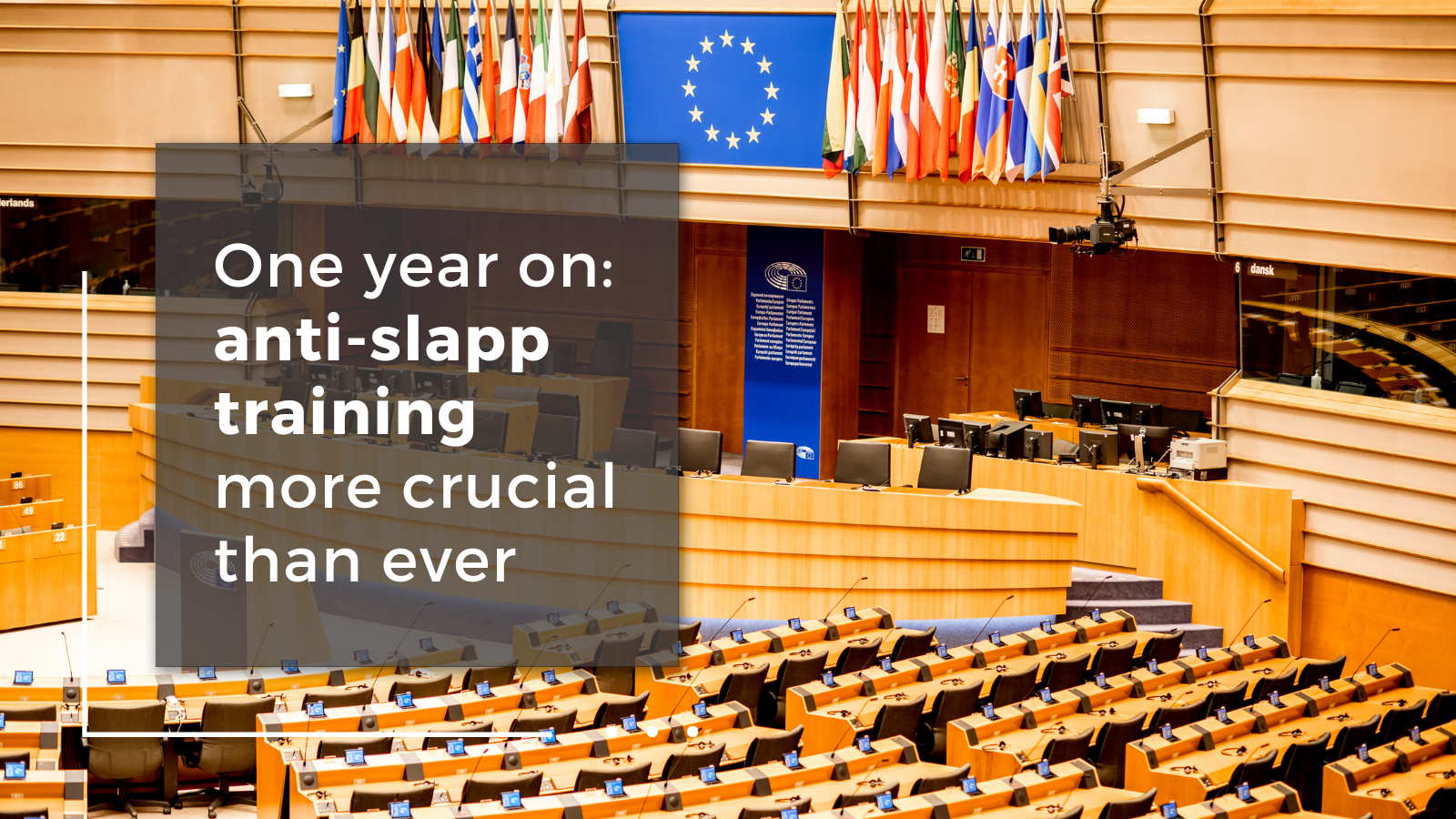
One year on: anti-SLAPP training is more crucial than ever
One year ago, on April 27, 2022 the European Commission (EC) adopted a proposal for an anti-SLAPP Directive, which is expected to provide procedural safeguards against commonly referred to as “strategic lawsuits against public participation” (SLAPPs) when they are related to civil matters and have cross-border implications.
The proposed package is based on three key pillars of protection: early dismissal of manifestly unfounded court proceedings; other remedies against abusive court proceedings (award of costs, damages and sanctions); and protection against SLAPP judgments issued by other third countries.
The proposal is now under legislative discussion in Brussels. Unfortunately, the compromise proposal published by the Presidency of the Council of the European Union radically reduces the scope of the procedural safeguards proposed by the EC, in particular the provisions dealing with cross-border cases. Consequently, the very purpose of the directive, i.e. to provide relevant protection against abusive claims directed against public watchdogs, is significantly weakened.
Much now depends on the progress of inter-institutional negotiations between the Council of Ministers, and the Commission and Parliament (“Trialogue”), the latter two much more supportive of stronger anti-SLAPP regulation.
Alongside the proposed Directive, last year the EC also adopted a complementary Recommendation urging Member States to adopt non-legislative measures aimed at training and awareness-raising for legal professionals and potential SLAPP victims, the implementation of support mechanisms, including legal aid, as well as data collection, reporting and monitoring.
Since February 2022, FIBGAR, together with other European organizations, is leading the PATFox project (Pioneering AntiSLAPP Training for Freedom of Expression), co-funded by the European Commission, which aims to train legal professionals on the challenges, legal and non-legal, through the design, development and implementation of the first anti-SLAPP curriculum in eleven EU Member States (Germany, Malta, Cyprus, Slovakia, Spain, Poland, Slovenia, Croatia, Romania, Bulgaria and Hungary).
Over the past year, the PATFox consortium has worked to achieve its two objectives: to develop the first European anti-SLAPP curriculum, and to train European lawyers to defend journalists and media organizations, NGOs and activists against these abusive lawsuits.
The anti-SLAPP curriculum draws on both international experience and European human rights principles, as well as local procedural expertise and case law.
The core curriculum is designed to provide a brief overview of the characteristics of Strategic Lawsuits Against Public Participation (SLAPPs) and how they can be identified, and then set the parameters of the relevant legal issues of the phenomenon. In this regard, it provides guidance on the interaction between SLAPPs and human rights and includes an analysis of the Proposed Anti-SLAPP Directive. Finally, the central theme analyzes the implications of SLAPPs in terms of private international law, and issues related to freedom of information and subject access requests.
On the other hand, local curricula have been developed based on specific local contexts, as different needs were identified reflecting a variety of challenges specific to different socio-cultural environments. Therefore, PATFox partners conducted holistic research on the SLAPP phenomenon in their countries, mapped the substantive and procedural tools used in each partner’s country for SLAPP purposes, examined the tools used to defend against SLAPP, investigated SLAPP targets and perpetrators, and conducted a case study analysis, highlighting any vulnerabilities exposed by the case.
Between November 2022 and February 2023, nearly 200 lawyers attended our 11 workshops, which were held. This first round of training has shown that there is a great need for adequate training for legal professionals (both judges and lawyers acting as advocates in proceedings), as well as for broader educational activities aimed at the public in all Member States, including outside our Consortium countries.
So, one year after the adoption of the anti-SLAPP package, while the negotiation process seems to betray the initial promises, training and awareness-raising activities seem to be the best strategy at our disposal to deal effectively with abusive claims against European journalists and human rights defenders.
Madrid, 27 / 04 / 2023.



